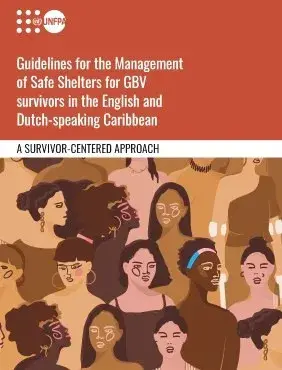The purpose of these guidelines is to provide practical guidance for the management of safe shelters and alternative accommodations for GBV survivors in the English and Dutch-speaking Caribbean. Notwithstanding, these guidelines may also be of use to individuals that work in other services with GBV survivors and in GBV responses, such as NGOs and local governments and authorities.
Although there is extensive literature on setting up safe shelters in emergencies and on the response to GBV, UNFPA identified a general gap around the provision of guidelines to set up and manage safe shelters and alternative accommodation for survivors of GBV. These guidelines are the result of an extensive regional desk review, online survey and subsequent semi-structured interviews with safe shelter managers from the English and Dutch- speaking Caribbean countries. These countries are not homogenous and the different experiences shared by safe shelter managers in the region will undoubtedly contribute to a wider understanding of the situation regarding this segment of the GBV response. The guidelines are therefore to be adapted by safe shelters throughout the region in accordance to their reality. While these guidelines are directed at the Caribbean and were built taking into account the expertise and experience of safe shelter managers in the region, safe shelter managers in other parts of the world are welcome to make use of them and to adapt them to their context.
These guidelines address the practical and functional aspects of setting up a safe shelter for GBV survivors, while focusing on a survivor- centred approach and on the principles of non- discrimination, respect, safety and confidentiality. Therefore, an important part of these guidelines concentrates on the accessibility of survivors and on the services to be provided in the safe shelters. Focus is also given to preparedness and response activities related to natural disasters and humanitarian emergencies as these increase the vulnerability of women and girls, further exposing them to GBV. It should be stressed that safe shelters should take all appropriate and possible steps to prepare for disasters and emergencies so that they are not caught off guard and do not have to resort to improvisation.
This work is also an invitation for other initiatives to be elaborated on safe shelters and alternative accommodations in other regions of the world. The sharing of experiences, findings, challenges and best practices will further enrich the literature and research around this topic.


